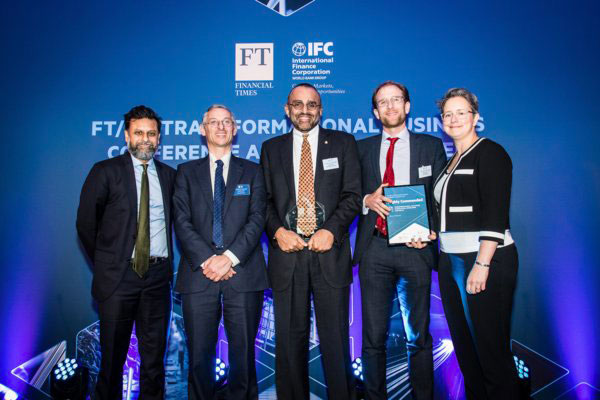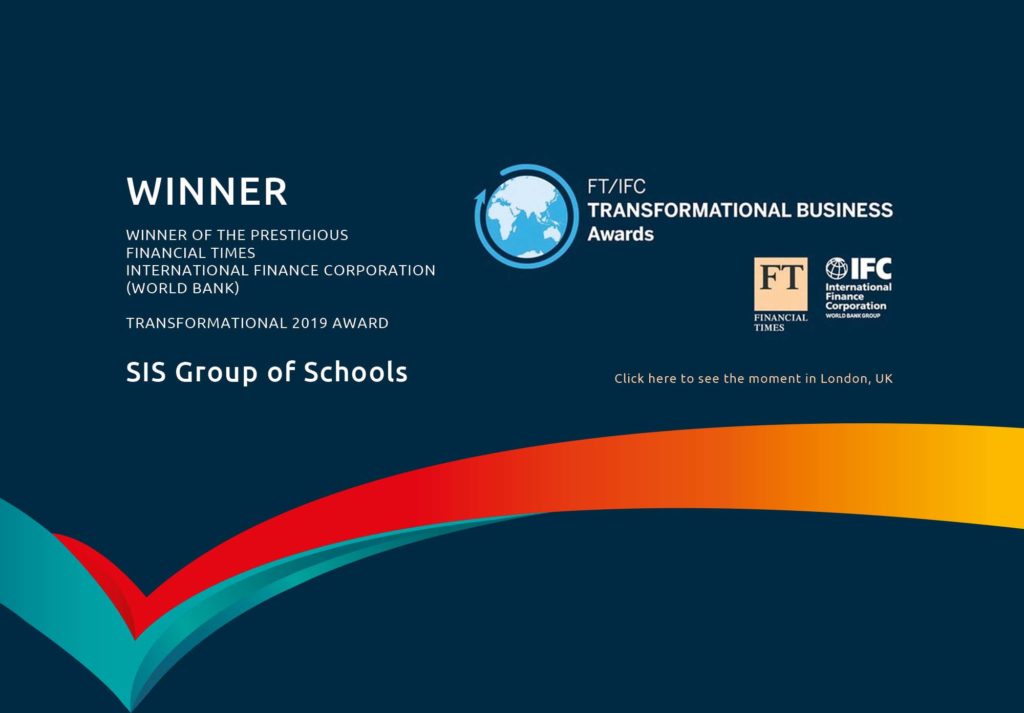Part 2 of the One-on-One interview with Jaspal Sidhu, Founder and Chairman of the SIS Group of Schools.
In the first part of the series, Jaspal Sidhu talked about the future of education. Here he discusses his vision of making quality education accessible for Indonesians from every economic background.
By Shoeb Kagda
IEF: “You spoke of out-standing qualities of teachers. And our coined the acronym EFFECTOR. Do you see some of these qualities in your teachers today? How do you embark these qualities into your teachers?”
JS: So, how do you train someone to be an Effector? If you look at those skills like Timeliness, if you look at those skills like being Open-minded, Researcher, these are all—a lot of them—are management soft skills. So, I think it’s time to bring in management-type soft skills into schools. And less of training of classroom management and content management. So I think a lot of the things that managers outside the industry have been trained in, we can bring into the class. Teachers need to be Funny; actually, there is a theory around how to funny. I mean look at all the standup comedians. I myself am researching to see how I can train my teachers to be funny. And Earnest is from the heart it’s a humanizing element, why are you being a teacher? You have got to be earnestly doing what you do. So I think majority of the skills can be trained, can be honed, and Shoeb a lot of these ideas lie outside the education industry, I think if you are in the education industry you should be looking for ideas outside the fence.
IEF: So in a way, education must join the sharing economy right? That’s where things are happening.
JS: Absolutely.
IEF: The sharing economy is injecting new ideas into a range of industries. How have you seen the growth of the education sector in Indonesia? You have been here almost 30 years.
JS: Positive. A lot of positive things. The last 3 decades we’ve seen literacy rates in Indonesia drop from 74 percent in 1994 to more than half now. So, kudos to the government. The number of people attending schools have increased. I’m just very happy to see this. Great progress by the Indonesia government. I also think there’s a shift in pedagogical thoughts, for example, traditionally when you and I went to school, education was very monodisciplinary right? The more you study the more you end up being an expert in one area. Today, studying still requires expertise in a particular field, but one also has to be knowledgeable in other areas because companies are going to ask you to multitask. I’m seeing this in some schools in Indonesia. I am encouraged. But I would like to see this more outside Jakarta. In Tier-B, Tier-C cities. I think that’s where the great opportunity is. That’s where the biggest impact will take place and that’s what I’m very seriously looking at.
IEF: Have you seen changes in the pedagogy, in the teaching methods, has it effected your business? Have you seen them shifting your own thinking within your business?
JS: We have our own teachers who sometimes are resistant to change, but we create this whole culture of collaboration. And I’m very big into collaboration. So my US$15,000 school a year, my US$7,000/year, US$4,000/year schools…well they are all collaborating. And when you collaborate, especially when you go down the tuition fee ladder, those schools have less access to best practices in the world because of budget restraints. But because they are part of our system, we feel we are able to trickle downwards these mind shift changes, this thinking processes. And I have seen some very, very good results in our own schools. I’m very encouraged. So much so, I am actually raising funding to put 10-15 schools down the tuition fee ladder into Tier-B and Tier-C cities. I remain encouraged.

IEF: That is good to hear. Also, you talked about the teaching role, how teachers are going to impact knowledge, how have these changes impacted the way your schools impart knowledge today?
JS: We are not a knee-jerk school group, so we don’t react to major developments very quickly but we do watch developments. I would say we are above the curve. We keep a close eye on Singapore, we keep a close eye on major education institutions and major changes in industry in the world largely through our World Bank contacts. I can, today, reach any school in the world through the IFC (World Bank) network. So this way we can learn a lot from other people. Our curriculum is live. It is evolving. We work within the industry and we bring people from outside the school system to share ideas. The SIS program, if I can share with you, is not just a curriculum. It’s a program, it’s a program that’s says we will prepare you with a world class curriculum over-laid with initiatives like learning journeys, inter-disciplinary projects and semester projects. Our student have gone onto universities like Imperial College, Oxford and National University of Singapore. So what I’m trying to say is you don’t have to spend US$ 30,000 to go to great universities. Education must be made accessible.
IEF: And on that point in terms of making education accessible, you are now launching the Inspirasi Schools, and I think it’s a great initiative and it’s a great idea, but more than that, I think it will have a huge impact, social impact, on Indonesia. What is your main objective behind the launch of Inspirasi?
JS: Let me first explain what is Inspirasi. Inspirasi is my new brand at a US$2,000/year price point. This is a network of schools that we are going to put across Indonesia. And for Inspirasi, I am driven by three mantras; One, the school must be impactful. Wherever I put it, it must be impactful, and that impact must be measurable. Number two, it must be financially sustainable. And Number three, of course, it must provide as much employment in that community as possible. And we bring in a lot of corporate principles, I am a firm believer of bringing ideas from outside the industry. So Inspirasi is our next generation of schools across Indonesia to be made accessible. We will look to partnering with groups like the IFC (World Bank). It will be a school which will be project-based. We are going to add a different dimension to the national curriculum. I’m are going to bring in the values of Pancasila. I’m going to look to ensure the school is focused on 21stcentury skills, which I call P.A.C.E; Perseverance, Analytical skills, Collaboration/Communication and, Entrepreneurism. And I’m going to bring back traditional sports and even the love for batik printing. It would be a school for Indonesians by Indonesians. And I’m going to put 20 of those across the country.
IEF: That is really impressive in terms of what you are trying to achieve. Are you working with the government on this or is it something that you can influence the state education system going forward?
JS: So where am I right now? Sometime in January, we will be on a major fund-raising drive. I will be heading to the U.S and the Middle East. I’m already talking to impact funds. There are a number of interested groups who want to fund Inspirasi, but I need to make sure its patient capital. In terms of the government, I will plan to work with local mayors and governors and work with them for an Inspirasi school in their constituency so that we can open our doors to train public school teachers. I mean think about it, these schools will be typically for Indonesians. Each school will have about 1,500 students, or may be 1,300. They in turn will be have about 100-130 teachers. Where am I going to get these teachers? I tell you I’ve been into the provinces. There is some passion out there that I just need to harness. So I’ll be working with expert groups to enhance our training program. I am going to work with universities to pick the most passionate teachers. Yes, we will have challenges but I love challenges.
IEF: Moving on a little bit, I think congratulations are in order for you as you recently won the prestigious Financial Times IFC Transformational Business award for transformational solutions in education, knowledge, and skills. For a school like yours to win such a global prestigious award, I think is a testimony to your efforts and to your vision. What is the transformational strategy?


JS: Many people don’t know this but SIS actually has put Indonesia on the world map. When they announced SIS as the winner that night my life became very busy. A lot of people wanted to know about Indonesia, wanted to know more about the education industry in Indonesia. First of all, what is this award? The Financial Times – IFC (World Bank) Transformational Award is given to education institutions around the world, whose work helps achieve the United Nations Sustainable Goals.
So, when we got nominated, we were amongst 100 world-wide enterprises who were selected. I’m talking about universities, schools, vocational institutions, polytechnics, international schools from which we were nominated. And the kind of questions that we were asked, the kind of evidence we have to put forward was quite detailed. So, 6 made it to the finals and SIS won. Why did we win this? We won this because I have shown that you can reduce the school fees, Remember I said US$30,000/year was cut to US$ 7,000/year and then cut to US$ 4,000/year and then cut to US$ 2,000/year. We can reduce the tuition fees and we can maintain quality by creating an ecosystem for schools to collaborate vertically up and down the tuition fee ladder. Collaborate vertically upwards, because when schools collaborate horizontally it’s the same dull ideas that hey share. But when they collaborate vertically upwards a mind shift happens because schools below the tuition fee ladder are exposed to best practices. The FT and IFC called the award the Oscars of Education awards. So, I was very pleased. And since then we’ve got requests to do schools as far as Africa. But I am keeping my eye on Indonesia first.
IEF: Well, I think there’s still a lot to be done in Indonesia, there’s huge potential for Indonesia. You have come a long way, where are you going from here? Where is your next goal?
JS: Like I said, I’ve been here 29 years. So, ya namanya orang Indonesia la, separuh Indonesia. Impian saya untuk Indonesia, (I am partly Indonesian, and my dream is for Indonesia) My mission is to make education accessible here. I am not moving from that. In the next 5 years, we will be doing 5 SIS schools with a tuition of about US$5,000 a year; Surabaya, Bandung, Makassar, one in Bali, and one in Kalimantan. So, with that I will be on every major island. I will also be putting 10 Inspirasi schools, spread out across Indonesia. We have actually done a study and we have picked out the cities and that’s our plan in the next five years.
IEF:And beyond that? Are you looking beyond 5 years?
JS: We must especially if I am going to raise funding from investors, they will want to know what’s happening beyond. As I expand into Indonesia, I am also looking at expanding in the region. In my Inspirasi schools, the students are going to interact with other international schools, so we are going to put footprints in Philippines, in Thailand and many other countries. Can you imagine an Indonesian student sitting in Lampung doing a project with another student in Kenya, where we will have schools? Can you imagine the power of that thought? Teachers in Malang collaborating with another teacher in Myanmar. That’s what Inspirasi will create. So there will be schools in the region beyond Indonesia.
IEF: That is a very ambitious program and you are a very confident person, but how confident are you that you will be achieving all this in the next decade?
JS: I’ve been asked this many times how confident I am. I am very confident. Why? Because I’ve done this before. I have taken SIS at a US$ 15,000/year price point I’ve halved that to US$7,000/year and we have several successful schools. I halved that to US$4,000/year and I have halved that to US$ 2,000/year. I have a playbook. We have systems in place. We need to pick great partners. You know I have one clear vision, which is to make good quality education accessible to as many income levels. Why? Because if anything is “Good”, it must be “Good” for everyone. “Good” cannot be the monopoly of one level of society. I will achieve what I have set to do .
IEF: We wish you all the luck possible and given your passion and drive, you have achieved the goals you are setting out to achieve. Thank you for joining us and I hope to continue this conversation again, maybe, in a year’s time to see how far you have come.

